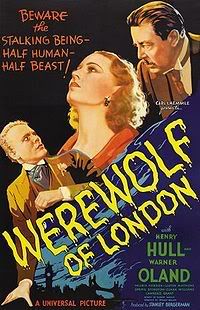
Finally Hollywood makes a movie about the cruel, cruel realm of botany. I've warned my students, particularly my AP Biology students to stay well away from the dark world of plants. Some warily heeded my advice, others were glad to, for it meant less studying, but there will be those who will be lured by the aromatic scents and beguiling colors of flowers or the promise of sweet-tasting sweetfruits. And then...oh, yes...then they'll know what I know (and have known since my early days at the university) and what Henry Hull learned all too late in the film. That insidious truth is botany leads to WEREWOLVES!!!!!!!!!!!!!!!!!!!!!!!
There will be some who will disagree that this is scarcely the point of the film, so I will make my argument here. Henry Hull plays well-meaning botanist Dr. Glendon, an individual who foolishly traverses to the wilds of eastern Europe to obtain the rare mariphasa plant. While there, he is bitten by a man-beast and disregards it as a nip from a competitor botanist. However, he soon comes to the realization, despite all known science, that he is afflicted with the cruelest form of lycanthropy - full-blown werewolfism. Fortunate for him that the mariphasa plant is the very cure for his disease. Too bad that its blooms are continuously stolen from him by competing botanist and competing werewolf Dr. Yogami. If it sounds like silly fun, it is.
And that's where they get you. Botanists, I mean. The entire film is clearly a piece of pro-botany doctrine. Consider the facts:
1. The film does for botany what "Raiders of the Lost Ark" does for archaeology. I wanted to be an archaeologist until I was ten and then I learned a cruel truth: movies lie. My brother John didn't learn this until after obtaining a degree in the field, poor sot.
2. It lauds flowers as cure-alls. If flowers can cure lycanthropy, then surely they can cure cancer, right? Bah. Flowers cause nothing but sickness. Think of where you see flowers the most. That's right, hospitals! They're the very carriers of vile plagues. And funeral homes...
3. Dr. Glendon is a wealthy, jet-setting gadfly. Since when did botanists turn into Lamont Cranston, I ask you? They aren't. Point in case: my botany teacher, Dr. Sengupta. Sure, she flew halfway across the world for botany, but what did it get her? A room full of unappreciative assholes like me who sit there thinking: "I don't give a fuck about the differences between a monocot and a eudicot! Sclerids? I wish I could get sclerid of you!"
4. Botanists get the girl. No, they don't.
Where does this blatant, pro-botany doctrine come from? None other than the founder of Universal Studios, Carl Laemmle! A brief search of the Internet reveals that Laemmle, whose studio produced "Werewolf of London," started his business with a little film called "Hiawatha." The film was based upon the poem by Dr. Henry Longfellow, who was a professor of Spanish at Harvard in the mid-1800's. Who happened to be Dr. Longfellow's close colleague at the time? None other than Dr. Asa Gray. Who is Dr. Gray, you ask? Why, a man credited with being the FATHER OF BOTANY IN THE UNITED STATES! It's all so clear now. This was a scheme decades in the making. The Illuminati, the Freemasons...they're all red herrings to distract humanity from the photosynthetic menace about us. I no longer care how this all began. What I want to know is: when will it end? When will it end?
Anyway, the overall film was quite entertaining, though it seems quite rushed at the end.
Watch the Trailer

No comments:
Post a Comment